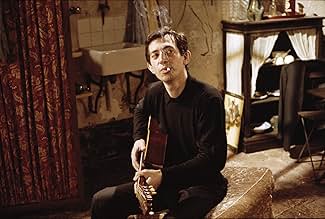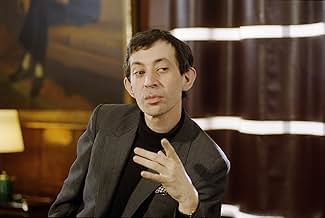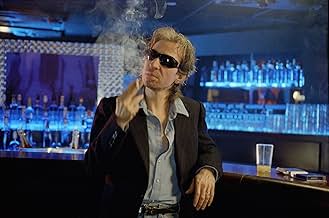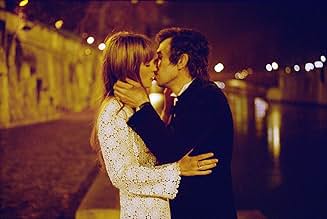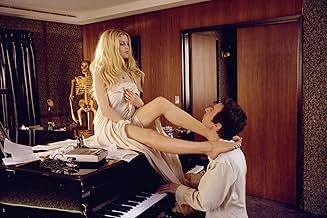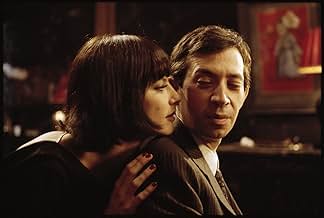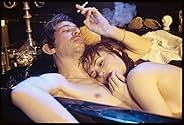CALIFICACIÓN DE IMDb
6.9/10
11 k
TU CALIFICACIÓN
Agrega una trama en tu idiomaA glimpse at the life of French singer Serge Gainsbourg, from growing up in 1940s Nazi-occupied Paris through his successful song-writing years in the 1960s to his death in 1991 at the age o... Leer todoA glimpse at the life of French singer Serge Gainsbourg, from growing up in 1940s Nazi-occupied Paris through his successful song-writing years in the 1960s to his death in 1991 at the age of 62.A glimpse at the life of French singer Serge Gainsbourg, from growing up in 1940s Nazi-occupied Paris through his successful song-writing years in the 1960s to his death in 1991 at the age of 62.
- Dirección
- Escritura
- Estrellas
- Premios
- 7 premios ganados y 11 nominaciones en total
Dinara Drukarova
- Olga Ginsburg (la mère)
- (as Dinara Droukarova)
- Dirección
- Escritura
- Todo el elenco y el equipo
- Producción, taquilla y más en IMDbPro
6.910.5K
1
2
3
4
5
6
7
8
9
10
Opiniones destacadas
a surreal version of an uncommon life
I did watch this film in it's premiere in Athens, at the festival of Franchophone films.I liked the movie which incorporated many surreal and fantasy elements in the linear narrative of the life of the hero. He had an alter ego, which was the substantiation of a childhood fantasy which always tried to tempt him to follow the broad path that led to riches, fame, sex and power. He followed the advice of his evil other self and he became the public icon we know from history and the media. Emphasis is also given to his Jewishness and his courage to manifest it before collaborationist authorities as a young boy.
Excepting the marked surreal elements which the director in an introductory speech attributed to the fact that he is also a comic strip creator, the film emphasizes what we already know, that is his incessant womanizing, publicity seeking and studied provocative stance, culminating in his memorable if controversial rendering of the Marselleise-the French national anthem-in a reggae music version and a refrain that was full of irony.
The sometimes overemphasized description of his rampant sexuality drove some of the audience out of the theatre as did the depiction of his reggae version of the French national anthem. But this was obviously an overreaction due either to ignorance or desire to cut a figure. If you had the slightest idea of who Gainsbourgh was, you would not be expecting anything else from a movie dedicated to his life story.
Because Gainsbough was prone to the pleasures of the flesh with women famous or ordinary, many impressive actresses such as Laetitia Casta and Anna Muglalis appear in the movie portraying the gorgeous women he had affairs with. The whole impression you form is that he had been a anti-authoritarian bobo(bourgeois-Boheme) before this term had been invented.
There is also a sensitive depiction of his relationship with his parents, which was closer and more intimate than one would expect from a man who had such an obvious (real or affected) grudge towards authority.The actresses play convincingly the women of his life, who were glamorous and sexy. In the end one is left with the question whether such a life is enviable and worthy of emulation or example to avoid. whichever answer each one reaches, as a spectacle it is surely interesting to see.
Excepting the marked surreal elements which the director in an introductory speech attributed to the fact that he is also a comic strip creator, the film emphasizes what we already know, that is his incessant womanizing, publicity seeking and studied provocative stance, culminating in his memorable if controversial rendering of the Marselleise-the French national anthem-in a reggae music version and a refrain that was full of irony.
The sometimes overemphasized description of his rampant sexuality drove some of the audience out of the theatre as did the depiction of his reggae version of the French national anthem. But this was obviously an overreaction due either to ignorance or desire to cut a figure. If you had the slightest idea of who Gainsbourgh was, you would not be expecting anything else from a movie dedicated to his life story.
Because Gainsbough was prone to the pleasures of the flesh with women famous or ordinary, many impressive actresses such as Laetitia Casta and Anna Muglalis appear in the movie portraying the gorgeous women he had affairs with. The whole impression you form is that he had been a anti-authoritarian bobo(bourgeois-Boheme) before this term had been invented.
There is also a sensitive depiction of his relationship with his parents, which was closer and more intimate than one would expect from a man who had such an obvious (real or affected) grudge towards authority.The actresses play convincingly the women of his life, who were glamorous and sexy. In the end one is left with the question whether such a life is enviable and worthy of emulation or example to avoid. whichever answer each one reaches, as a spectacle it is surely interesting to see.
Was it really two hours ? It felt like five minutes ...
There was probably a good few hundred reasons to fail that movie about the life of the most famous french song writer but I was happy to find out the director didn't fall in any of these traps. This movie was poetic, touching, elegant and engaging. Retracing Lucien Ginsburg's life with style and a touch of romanticism, the two hours unfolded so quickly that I was almost surprised when the credits started to roll. From his childhood in Nazi occupied Paris to his encounters with Boris Vian or Les Freres Jacques, from his rise to success with Bardot or Jane Birkin, the story marks all the important moments in the life of this unforgettable composer that has left many generations dazzled by his craftsmanship.
Eric Elmosnino is simply gigantic in this role, conjuring all the greatness of Serge Gainsbourg, letting us get a glimpse of its never seen before talent as well as his fragility. The staging of an alter ego representing his genie, pushing and pulling him to become the man we know is right on the spot to express his inner conflict to choose between painting and music. Music is a minor art, the man used to say as he recorded albums upon albums that are still to this day amongst the most compelling creations in french song writing. Many bits of lyrics used throughout the movie are poking the aficionado in the best way possible.
Avoiding the traps of linear storytelling as it has to respect chronological events, it goes back and forth through time using the protagonist at different periods of his life to put in perspective what goes on in his mind. From young Lucien to l'Homme à Tête de Chou, from the fusion of Serge with his genie to become Gainsbarre, I spent an exquisite moment in the life of a man whose music and lyrical excellence have touched me as a teenager and still remain a defining influence in my life. No need to say the music is beautifully embedded in this graceful biography.
The only minor inconvenience I could point out is Laetitia Casta that plays Brigitte Bardot without an ounce of talent, but fortunately these scenes are short and quickly forgotten. I recommend this film to anyone that has remotely enjoyed Gainsbourg's artwork at any point in his life for it is an amazing and poetic experience you will not regret. It is brilliantly shot and edited with both rhythm and attention to quiet emotional scenes. It takes you up and down with the protagonist's questioning about the meaning of his life and his descent to hell from which he never came back. Thank you Johan Sfar.
Ugliness is in a way superior to beauty because it lasts.
Serge Gainsbourg
(www.radiostationexp.blogspot.com)
Eric Elmosnino is simply gigantic in this role, conjuring all the greatness of Serge Gainsbourg, letting us get a glimpse of its never seen before talent as well as his fragility. The staging of an alter ego representing his genie, pushing and pulling him to become the man we know is right on the spot to express his inner conflict to choose between painting and music. Music is a minor art, the man used to say as he recorded albums upon albums that are still to this day amongst the most compelling creations in french song writing. Many bits of lyrics used throughout the movie are poking the aficionado in the best way possible.
Avoiding the traps of linear storytelling as it has to respect chronological events, it goes back and forth through time using the protagonist at different periods of his life to put in perspective what goes on in his mind. From young Lucien to l'Homme à Tête de Chou, from the fusion of Serge with his genie to become Gainsbarre, I spent an exquisite moment in the life of a man whose music and lyrical excellence have touched me as a teenager and still remain a defining influence in my life. No need to say the music is beautifully embedded in this graceful biography.
The only minor inconvenience I could point out is Laetitia Casta that plays Brigitte Bardot without an ounce of talent, but fortunately these scenes are short and quickly forgotten. I recommend this film to anyone that has remotely enjoyed Gainsbourg's artwork at any point in his life for it is an amazing and poetic experience you will not regret. It is brilliantly shot and edited with both rhythm and attention to quiet emotional scenes. It takes you up and down with the protagonist's questioning about the meaning of his life and his descent to hell from which he never came back. Thank you Johan Sfar.
Ugliness is in a way superior to beauty because it lasts.
Serge Gainsbourg
(www.radiostationexp.blogspot.com)
a complex work about France in the 20th century and about one of its major artists
Where does this amazing film come from? Who is Joann Sfar, a director I never heard about before? The easiest answer at hand was the wikipedia entry which tells us that Sfar is a well known comics author in the fabulous French-Belgian tradition. He is of Jewish origin, and his next film is an adaptation of one of his comics successes called The Rabbi's Cat.
And suddenly all makes sense. The opening scenes of the film contain the key of the biography of French musician and poet Serge Gainsbourg as imagined by Sfar. We see Lucien Ginzburg, a Jewish kid in occupied Paris during WWII daring not only to laugh in fronde at the nose of the collaborationist police by being the first in line to receive his yellow Star of David as a sign of nobility rather than an anathema, but moreover, to transform in his mind and his sketch drawings the fat rapacious Jew on the Vichy posters in the thin, stylish, long nose and big years Gueule - the alter-ego who will guide his steps and feed his revenging self-confidence for the rest of his life.
The combination of acting and cartoon is not a new thing, but it has never been tried before in a biopic to the best of my knowledge. Sure, it is not the usual respectful biopic but it's the vision of Sfar about Ginzburg - Gainsbourg, and Sfar he says in the final text before the credits was more interested about Gainsbourg lies than by his perceived truths. Moreover, for sure Gainsbourg himself would not have appreciated a respectful film. Ironically under-titled 'Vie heroique' (heroic life) the film takes us though the artistic and especially womanizing career of Gainsbourg from the early 50s to the late 70s. We see him in the company of such French cultural icon as Boris Vian and especially of fabulous women such as Juliette Greco, Brigitte Bardot and Jane Birkin (and actually the list in the film is very partial). I enjoyed each of the scenes in this part of the film which combine style, attention to details (just follow how fashion changes marking the progress of time) and deep understanding of the atmosphere of the Parisian clubs and artistic milieu in the mythic mid-20 century. His Gueule alter-ego mentors him though this trip and when he decides to renounce his patronizing, it's the beginning of the end - the charisma goes away and the effects of his excesses slowly destroy him. Maybe a little more of his art would have provided an even more complex and balanced image of the person that Gainsbourg was - this would be my only observation.
The choice of Eric Elmosnino as Gainsbourg is excellent, he drives the character from the insecurity of the young age to the decay of the end, all the time with charm and deep empathy. He proves a perfect understanding of the intentions of the director and a full identification with the identity dilemmas of the French-Jewish Gainsbourg. Laetitia Casta is a perfect replica of Bardot. Lucy Gordon is mastering very well Jane Birkin's role. Her maturity makes even harder to explain the suicide of the young actress a few days before the film was presented in avant-premiere at Cannes.
And suddenly all makes sense. The opening scenes of the film contain the key of the biography of French musician and poet Serge Gainsbourg as imagined by Sfar. We see Lucien Ginzburg, a Jewish kid in occupied Paris during WWII daring not only to laugh in fronde at the nose of the collaborationist police by being the first in line to receive his yellow Star of David as a sign of nobility rather than an anathema, but moreover, to transform in his mind and his sketch drawings the fat rapacious Jew on the Vichy posters in the thin, stylish, long nose and big years Gueule - the alter-ego who will guide his steps and feed his revenging self-confidence for the rest of his life.
The combination of acting and cartoon is not a new thing, but it has never been tried before in a biopic to the best of my knowledge. Sure, it is not the usual respectful biopic but it's the vision of Sfar about Ginzburg - Gainsbourg, and Sfar he says in the final text before the credits was more interested about Gainsbourg lies than by his perceived truths. Moreover, for sure Gainsbourg himself would not have appreciated a respectful film. Ironically under-titled 'Vie heroique' (heroic life) the film takes us though the artistic and especially womanizing career of Gainsbourg from the early 50s to the late 70s. We see him in the company of such French cultural icon as Boris Vian and especially of fabulous women such as Juliette Greco, Brigitte Bardot and Jane Birkin (and actually the list in the film is very partial). I enjoyed each of the scenes in this part of the film which combine style, attention to details (just follow how fashion changes marking the progress of time) and deep understanding of the atmosphere of the Parisian clubs and artistic milieu in the mythic mid-20 century. His Gueule alter-ego mentors him though this trip and when he decides to renounce his patronizing, it's the beginning of the end - the charisma goes away and the effects of his excesses slowly destroy him. Maybe a little more of his art would have provided an even more complex and balanced image of the person that Gainsbourg was - this would be my only observation.
The choice of Eric Elmosnino as Gainsbourg is excellent, he drives the character from the insecurity of the young age to the decay of the end, all the time with charm and deep empathy. He proves a perfect understanding of the intentions of the director and a full identification with the identity dilemmas of the French-Jewish Gainsbourg. Laetitia Casta is a perfect replica of Bardot. Lucy Gordon is mastering very well Jane Birkin's role. Her maturity makes even harder to explain the suicide of the young actress a few days before the film was presented in avant-premiere at Cannes.
It's not big or clever to smoke, and it doesn't make you look cool unless you happen to be Serge Gainsbourg !
GAINSBOURG (Vie héroïque)
from the Studio Canal stable depicts the life story of Serge Gainsbourg from early childhood in the 1930's and 40's, until just before his death in 1991.
Born Lucien Ginsburg – and as an impressionable youth he felt outcast as being a Jewish child in Nazi occupied Paris in the 1940's – leading him to develop an imaginary friend who adopted an increasingly grotesque caricature / persona of himself that would lead him on to do more and more outrageous things to "rebel" his situation and to attempt to gain an element of "love" and "acceptance" from his notoriety.
A talented musician and artist, Lucien (who later was persuaded by friends to change his name to the more "acceptable" Serge Gainsbourg) became the darling of the social scene, charming his way through a succession of affairs with beautiful women – most notably Brigitte Bardot, Juliette Greco, and Jane Birkin.
I'm surprised that they didn't have a cigarette company sponsoring this movie – as the sheer amount of fags smoked during this film must be some sort of record!
After the showing of the film (at the Cineworld, Haymarket, London) we were treated to a Question and Answer session with the Writer / Director of this movie JOANN SFAR, who explained that the idea for the film came from his own graphic novel on Serge Gainsbourg penned by JOANN SFAR – and this pretty much formed the construct and ambiance of the movie – it is highly graphical and visual in it's content – much of it being fantasy visions and flashbacks within Gainsbourg's mind. Talking from the heart – Joann showed a real passion for the film, and was very open as to how the film was created.
Gainsbourg became the darling of French society with his talent and flair – but he also would court scandal and became infamous for the release of "Je t'aime... moi non plus" (which he originally wrote for Bardot) and the seemingly disrespectful reggae version of the French national anthem "La Marseillaise", but love him or loath him – you couldn't ignore him ..
The whole movie is very atmospheric, and some of the casting of this film was inspired – especially the terrific performances by Eric Elmosnini in the title role, the stunning beautiful Laetitia Casta as Brigitte Bardot, Lucy Gordon as Jane Birkin, Anna Mouglalis as Juliette Greco and Kacey Mottet Klein as the young Lucien Ginsburg.
At the end credits of the film is a dedication "to Lucy" which referred to the actress Lucy Gordon – who (the director explained) played the part of Jane Birkin in the film – and who had tragically committed suicide during the final editing parts of the film – a talented actress – and a sad loss.
At 2 hours 10mins long, in French with English subtitles GAINSBOURG will not be everyone's cup of tea but the film DOES keep you entertained and if you give it a chance, I'm sure that you will not be disappointed ...
It's not big or clever to smoke, and it doesn't make you look cool unless you happen to be Serge Gainsbourg !
GAINSBOURG is on general release from 30th July 2010
Born Lucien Ginsburg – and as an impressionable youth he felt outcast as being a Jewish child in Nazi occupied Paris in the 1940's – leading him to develop an imaginary friend who adopted an increasingly grotesque caricature / persona of himself that would lead him on to do more and more outrageous things to "rebel" his situation and to attempt to gain an element of "love" and "acceptance" from his notoriety.
A talented musician and artist, Lucien (who later was persuaded by friends to change his name to the more "acceptable" Serge Gainsbourg) became the darling of the social scene, charming his way through a succession of affairs with beautiful women – most notably Brigitte Bardot, Juliette Greco, and Jane Birkin.
I'm surprised that they didn't have a cigarette company sponsoring this movie – as the sheer amount of fags smoked during this film must be some sort of record!
After the showing of the film (at the Cineworld, Haymarket, London) we were treated to a Question and Answer session with the Writer / Director of this movie JOANN SFAR, who explained that the idea for the film came from his own graphic novel on Serge Gainsbourg penned by JOANN SFAR – and this pretty much formed the construct and ambiance of the movie – it is highly graphical and visual in it's content – much of it being fantasy visions and flashbacks within Gainsbourg's mind. Talking from the heart – Joann showed a real passion for the film, and was very open as to how the film was created.
Gainsbourg became the darling of French society with his talent and flair – but he also would court scandal and became infamous for the release of "Je t'aime... moi non plus" (which he originally wrote for Bardot) and the seemingly disrespectful reggae version of the French national anthem "La Marseillaise", but love him or loath him – you couldn't ignore him ..
The whole movie is very atmospheric, and some of the casting of this film was inspired – especially the terrific performances by Eric Elmosnini in the title role, the stunning beautiful Laetitia Casta as Brigitte Bardot, Lucy Gordon as Jane Birkin, Anna Mouglalis as Juliette Greco and Kacey Mottet Klein as the young Lucien Ginsburg.
At the end credits of the film is a dedication "to Lucy" which referred to the actress Lucy Gordon – who (the director explained) played the part of Jane Birkin in the film – and who had tragically committed suicide during the final editing parts of the film – a talented actress – and a sad loss.
At 2 hours 10mins long, in French with English subtitles GAINSBOURG will not be everyone's cup of tea but the film DOES keep you entertained and if you give it a chance, I'm sure that you will not be disappointed ...
It's not big or clever to smoke, and it doesn't make you look cool unless you happen to be Serge Gainsbourg !
GAINSBOURG is on general release from 30th July 2010
Biopic that sort of works
As an Englishman I didn't have as much of an idea of Serge Gs career as most of the previous critics here, so a lot of this film was pretty educational. However, it wasn't a literal biopic by any means, using the cartoon characters alongside Serge (quite well, I thought) and the latter half of his life (I didn't realise when or whether he'd died until I'd read one of your reviewers!) seemed to tail off into nothing, even more than his increasing physical degradation was suggesting.
I found the emphasis on his sexual groundbreaking and role as a general iconoclast a bit similar to the film "Mesrine" which came out a year or two back - a similar time period was covered in that - masses of smoke and sexism! The actresses playing Jane Birkin and Juliette Greco are good (especially Jane Bs English/French accent) but "Brigitte Bardot" less so, and the scenes with her do go on a bit (although some of the poses are meant to correspond with real Bardot roles like "Et Dieu Crea La Femme" and "La Mepris".
The music fits in well with the film and, surprisingly - with the film making style - the intrusion of early 1960s loud pop, and of reggae, is quite a shock to the system, as it is intended to be, and was at the time. Perhaps I'm missing some of the French references, but in general the milieu Gainsbourg moved in might not be best served by a "straight" biopic with a Nicholas Cage-type performance, but the surrealist cartoons do detract from the picture we get of Serge - and believe me, it's not that easy to like him! I wasn't that keen on the precocious young boy stage of his life either - a bit too "that's the French way boys grow up" all very pre-Simone de Beauvoir.
Anyway shouldn't carp too long - I was glad I saw it and a lot will stay with me, although I'll remember the Django-type guitar playing possibly longer than the (apparently rather few) Gainsbourg songs which graced the soundtrack.
I found the emphasis on his sexual groundbreaking and role as a general iconoclast a bit similar to the film "Mesrine" which came out a year or two back - a similar time period was covered in that - masses of smoke and sexism! The actresses playing Jane Birkin and Juliette Greco are good (especially Jane Bs English/French accent) but "Brigitte Bardot" less so, and the scenes with her do go on a bit (although some of the poses are meant to correspond with real Bardot roles like "Et Dieu Crea La Femme" and "La Mepris".
The music fits in well with the film and, surprisingly - with the film making style - the intrusion of early 1960s loud pop, and of reggae, is quite a shock to the system, as it is intended to be, and was at the time. Perhaps I'm missing some of the French references, but in general the milieu Gainsbourg moved in might not be best served by a "straight" biopic with a Nicholas Cage-type performance, but the surrealist cartoons do detract from the picture we get of Serge - and believe me, it's not that easy to like him! I wasn't that keen on the precocious young boy stage of his life either - a bit too "that's the French way boys grow up" all very pre-Simone de Beauvoir.
Anyway shouldn't carp too long - I was glad I saw it and a lot will stay with me, although I'll remember the Django-type guitar playing possibly longer than the (apparently rather few) Gainsbourg songs which graced the soundtrack.
¿Sabías que…?
- TriviaThe project was originally envisioned with Serge Gainsbourg's real life daughter, actress Charlotte Gainsbourg to play him in keeping with the film's surreal and fairytale-esque tone. Six months into rehearsals and preparation Gainsbourg pulled out telling director Joann Sfar, it was proving too emotionally painful and he would have to make his "beautiful film" without her. Sfar had always approached the film with her in mind and was ready to abort the project when fate lead him to Eric Elmosnino.
- ErroresThe young Gainsbourg is shown drawing left-handed, but the adult Gainsbourg becomes right-handed.
- Citas
Serge Gainsbourg: [after a man tips him while he plays the piano] What are you fucking kidding me? I'm not a jukebox!
- Créditos curiosos"Pour Lucy" i.e. this was Lucy Gordon 's last film.
- Versiones alternativasEngland is the first territory to release a new cut of the film, running 14 minutes shorter than the previous version and is Joann Sfar's preferred one. Changes include -
- Deletion of the scene where young Serge pleads in vain for his mother to buy him a gun to play with, even attempting to bribe her by saying he'll work harder on the piano. This precedes the scene where he steals the gun from the shop.
- Deletion of the scene where Serge and Boris Vian walk to his apartment and the two lie in the road in an effort to stop a cab. While they wait Serge reveals he has a double that follows him around to which Vian replies his is a werewolf. However two policemen soon cut the conversation short. (This precedes Serge arriving at Boris's apartment and explains a later scene where a drunken Serge lies in the road before having the police escort to his concert)
- Longer scene of the "Baby Pop" groupies, as Gainsbourg wakes up in bed with two naked women as his Mug joyously tosses bank statements at him revealing how rich he is from "Poupée de cire, poupée de son" alone! This is the original lead in to "Qui Est In Qui Est Out".
- The groupies and party to "Qui Est In Qui Est Out" is cut short, removing Serge narrating about "the mouth being the primary sexual organ". His narration reveals the girls in the room he has slept with and how he was with them. It reveals Gainsbourg's occasional cruel streak and precedes the angry neighbor banging on the door.
- After Gainsbourg recites La Marseillaise at the press conference, we then see young Serge repeating it and triumphantly raising his fist to the audience.
- Deletion of a short exchange in the nightclub when a reveller comments to Gainsbourg about him being parodied on a French TV show. The new version removes these lines either because the show is unknown outside of France or because it doesn't tie in as being the night Gainsbourg met his wife Bambou as that TV show wouldn't air until years later. Sfar has said this new version will be the one further released worldwide.
- ConexionesFeatured in De wereld draait door: Episode #5.128 (2010)
Selecciones populares
Inicia sesión para calificar y agrega a la lista de videos para obtener recomendaciones personalizadas
Detalles
- Fecha de lanzamiento
- País de origen
- Sitios oficiales
- Idiomas
- También se conoce como
- Gainsbourg: A Heroic Life
- Locaciones de filmación
- Rue de Verneuil, Paris 6, París, Francia(Gainsbourg's house)
- Productoras
- Ver más créditos de la compañía en IMDbPro
Taquilla
- Presupuesto
- EUR 11,500,000 (estimado)
- Total en EE. UU. y Canadá
- USD 233,007
- Fin de semana de estreno en EE. UU. y Canadá
- USD 25,189
- 4 sep 2011
- Total a nivel mundial
- USD 12,220,456
- Tiempo de ejecución
- 2h 15min(135 min)
- Color
- Mezcla de sonido
- Relación de aspecto
- 2.35 : 1
Contribuir a esta página
Sugiere una edición o agrega el contenido que falta




